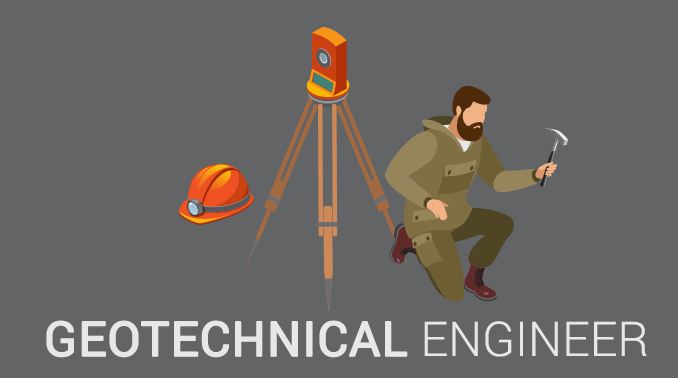Our Geotheta Diaries
Our Geotheta Diaries
Blog Article
The Main Principles Of Geotheta
Table of ContentsSome Ideas on Geotheta You Need To KnowGeotheta for BeginnersA Biased View of GeothetaLittle Known Questions About Geotheta.The Best Strategy To Use For Geotheta

They carry out site investigations, accumulate samples, do lab examinations, and examine information to evaluate the viability of the ground for building and construction projects - Engineer of Record. Based on their findings, geotechnical engineers supply referrals for structure style, incline stability, retaining structures, and reduction of geotechnical risks. They team up with other experts, such as engineers, architectural designers, and construction teams, to ensure that geotechnical factors to consider are incorporated right into the overall project design and execution
By examining the habits and homes of soil and rock, they can recognize potential geotechnical risks such as landslides, soil settlement, or slope instability. Their competence helps stop failures or accidents that could threaten lives and residential property. Right here are some comprehensive duties and obligations of a geotechnical engineer: Website Examination: Geotechnical engineers conduct website investigations to gather data on subsurface conditions.
They analyze the information to recognize the residential or commercial properties and habits of the soil and rock, including their toughness, permeability, compaction features, and groundwater conditions. Geotechnical Evaluation and Style: Geotechnical designers analyze the data gathered throughout site examinations to examine the security and viability of the site for building projects. They perform geotechnical calculations and modeling to examine factors such as birthing capacity, settlement, slope security, lateral earth stress, and groundwater flow.
What Does Geotheta Do?
Structure Style: Geotechnical designers play a critical role in designing structures that can securely support the desired framework. They examine the dirt conditions and load needs to identify the suitable structure type, such as superficial foundations (e.g., footings), deep foundations (e.g (https://geotheta.start.page)., piles), or specialized techniques like soil renovation. They consider elements such as negotiation limits, bearing ability, and soil-structure communication to establish ideal structure layouts
They assess building plans, screen site tasks, and perform field inspections to validate that the design recommendations are complied with. If unexpected geotechnical concerns emerge, they evaluate the situation and offer recommendations for remediation or changes to the design. Danger Assessment and Reduction: Geotechnical engineers analyze geotechnical hazards and threats connected with the task site, such as landslides, liquefaction, or soil disintegration.

Partnership and Communication: Geotechnical engineers function closely with various other professionals associated with a task, such as engineers, architectural designers, and building and construction teams. Efficient interaction and cooperation are vital to integrate geotechnical considerations into the general job layout and building and construction procedure. Geotechnical designers supply technical competence, solution queries, and ensure that geotechnical demands are satisfied.
How Geotheta can Save You Time, Stress, and Money.
Here are some kinds of geotechnical engineers: Foundation Designer: Structure designers concentrate on developing and analyzing structures for structures. They analyze the dirt problems, load requirements, and site characteristics to establish one of the most ideal foundation type and style, such as superficial structures, deep foundations, or specialized methods like stack foundations.
They review the elements influencing slope stability, such as soil buildings, groundwater problems, and slope geometry, and establish strategies to stop incline failures and mitigate risks. Quake Engineer: Earthquake designers concentrate on evaluating and making frameworks to hold up against seismic forces. They assess the seismic risk of a website, assess dirt liquefaction capacity, and develop seismic layout criteria to ensure the security and strength of structures during earthquakes.
They do field testing, accumulate samples, and examine the accumulated information to characterize the dirt buildings, geologic formations, and groundwater problems at a site. Geotechnical Instrumentation Engineer: Geotechnical instrumentation engineers focus on monitoring and determining the habits of soil, rock, and structures. They set up and preserve instrumentation systems that monitor factors such as dirt settlement, groundwater degrees, slope activities, and architectural displacements to analyze performance and give early warnings of prospective problems.
Fascination About Geotheta
They perform examinations such as triaxial examinations, consolidation examinations, straight shear examinations, and leaks in the structure tests to gather data for geotechnical analysis and style. Geosynthetics Engineer: Geosynthetics designers concentrate on the style and application of geosynthetic products, such as geotextiles, geogrids, and geomembranes. They make use of these materials to boost dirt stability, enhance inclines, supply water drainage remedies, and control erosion.
They tend to be investigative individuals, which means they're intellectual, introspective, and curious. They wonder, systematic, sensible, analytical, and rational. Some of them are additionally social, suggesting they're kind, generous, cooperative, patient, caring, practical, empathetic, skillful, and pleasant. Does this seem like you? Take our complimentary career test to discover if geotechnical engineer is just one of your top career suits.
In the workplace atmosphere, geotechnical engineers make use of specialized software tools to execute calculations, develop layouts, and analyze data. They prepare records, evaluation job specs, connect with customers and employee, and coordinate job tasks. The workplace setup offers a favorable environment for research study, analysis, and partnership with other professionals associated with the job.
The smart Trick of Geotheta That Nobody is Discussing
They regularly check out project sites to conduct website investigations, evaluate geotechnical problems, and gather data for analysis. These gos to involve taking a trip to different locations, often in remote or tough terrains. Geotechnical engineers might perform dirt sampling, conduct tests, and display construction tasks to make certain that the geotechnical facets of the project are being applied correctly.
Geotechnical engineers also work in specialized geotechnical labs. Geotechnical lab designers function thoroughly description in these settings, taking care of testing devices, operating instruments, and recording data.
Report this page